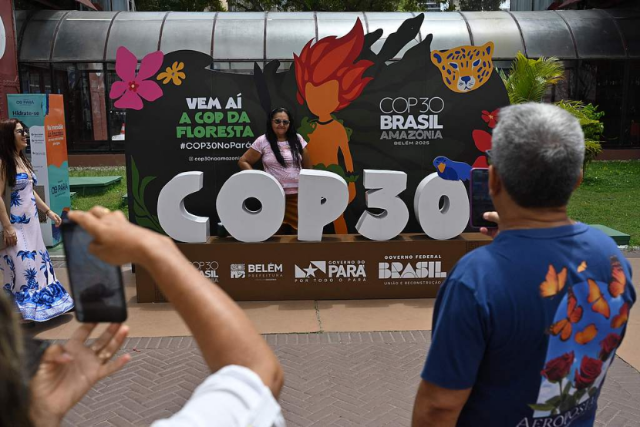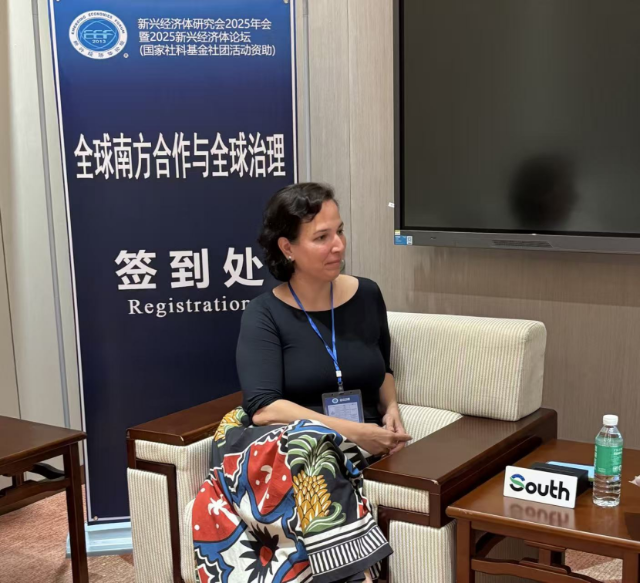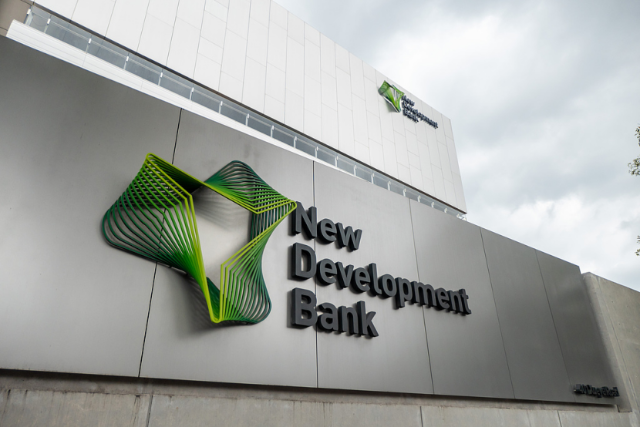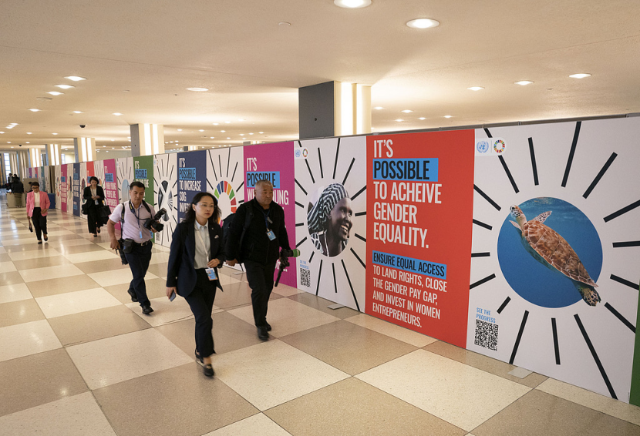
A tourist poses for a picture with the COP30 mascot inside the Estacao das Docas in Belem, Brazil, on Nov. 7, 2025. (Photo: CFP)
The United Nations Climate Change Conferences (COP30) kicked off on November 10 in the Brazilian city of Belém to again converge concerted efforts of countries to address climate change.
As COP30 marks the 10th anniversary of the signing of the Paris Agreement, the aim for countries to limit the rise in global average temperature to well below 1.5°C, set a decade ago, has not yet been achieved.
In an exclusive interview recently, Brazilian economist Karin Costa Vazquez, Non-Resident Senior Fellow at the Center for China and Globalization, encourages the Global South to work jointly on tropical forests and carbon markets to reach this target.
She also highlighted the New Development Bank (NDB)'s role in sustainable development for Global South countries and expressed hopes that they would set their own agendas after the Sustainable Development Goals (SDG) 2030.

Karin Costa Vazquez receives the interview with South in Zhaoqing, Guangdong on Nov. 8, 2025. (Photo: Zhaoqing University)
Global South needs to work jointly on tropical forests and carbon markets
"There are several financial instruments being launched during COP30," Vazquez noted. "A critical collaboration opportunity for Global South countries to consider is the Tropical Forest Forever Facility (TFFF)."
Formally launched on Nov. 6, TFFF is designed as a “payment-for-performance” model that uses agreed satellite monitoring standards and systems to reward tropical forest countries with a continuous source of funding as long as they preserve their forests.
"Most tropical forests are in the Global South. This mechanism will benefit many of the Global South countries if it's taken forward. All indications suggest that it's going to be a successful endeavor," Vazquez added.
Moreover, she pointed out another critical area of collaboration that "few people are looking at the moment": carbon markets, or more precisely, the integration of carbon markets.
As Vazquez introduced, Brazil has just created its national carbon market. Earlier this October 2025, President Luiz Inácio Lula da Silva signed a decree creating the Extraordinary Secretariat for the Carbon Market within the Ministry of Finance. The country is regulating this market and establishing the taxonomy and rules.
"Integrating these different markets implies greater opportunities for countries to exchange credits amongst themselves," stated Vazquez.
When the rules are integrated, countries will more easily communicate with each other. "This will be a very important instrument for countries as they pursue their deforestation and carbon reduction goals."

New Development Bank in Shanghai on Sept. 3, 2021 (Photo: CFP)
NDB's growing influence on sustainable development goals in Global South
In late January of this year, the Donald Trump-led US withdrew from the Paris Agreement.
Andre Correa do Lago, president of COP30, noted that under President Joe Biden, the US implemented new policies to fight climate change and worked to strengthen the role of multilateral development banks (MDBs), such as the World Bank, to increase financing for projects aimed at curbing global warming.
Without such actions, Correa do Lago added, increasing climate finance “will certainly be harder now.”
A European Investment Bank report published in October this year found that MDBs provided a record $137 billion in climate finance in 2024 and mobilized $134 billion in private finance for climate investments last year.
The report combines data from the World Bank Group, regional MDBs including the Asian Infrastructure Investment Bank (AIIB), and the NDB.
Vazquez outlined that with the creation of the 2030 development agenda back in 2015, the AIIB and NDB have sustainable development in their core mission. Additionally, the NDB specifically emerged as a response to the stalemate in the reforms of the IMF and the World Bank.
The Bretton Woods institutions have, over time, decreased investments in infrastructure finance, which is critical for many Global South countries. "The NDB comes as a solution to fill a gap left by these traditional Bretton Woods institutions," noted Vazquez.
But more than infrastructure financing, she projected that the NDB has the potential to create new instruments that more closely address the specific needs of the Global South, such as local currency financing to avoid currency fluctuations.

People walk past a Sustainable Development Goals themed display board at the UN Headquarters in New York City on Sept. 18, 2023. (Photo: CFP)
Global South countries need to set their own agendas after SDG 2030
"We are approaching the end of the 2030 development agenda. Unfortunately, the sustainable development goals coincide with a time when development is no longer prioritized," Vazquez lamented.
She elaborated that investments are being directed to finance wars rather than development. "In fact, funds are being withdrawn from development activities to finance conflicts worldwide."
"It's a crucial moment," she warned. "Countries in the Global South are building their financial capacities and need to establish their own agendas to articulate what truly matters to them in the next development framework after 2030," she proposed.
Reporter: Zhang Ruijun
Editor: Yuan Zixiang, James Campion, Shen He, Ouyang Yan
















